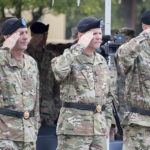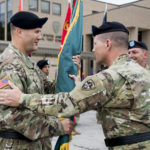By Michael M. Novogradac, U.S. Army Operational Test Command Public Affairs
WEST FORT HOOD, Texas — The unit responsible for testing new and modernized Army equipment welcomed its 28th commander during a change of command ceremony here Thursday.
Brig. Gen. William “Hank” Taylor comes to the U.S. Army Operational Test Command as its 28th commander after his most recent stint as Deputy Commanding General for Maneuver at the storied 1st Cavalry Division.
Taylor began his career as an enlisted Soldier in the Field Artillery during 1988, and was commissioned a second lieutenant in the Infantry during 1990, and in 1991, he attended the Aviation Officer Basic Course and Flight School.
He has served four operational assignments in Afghanistan and two in Iraq.
Outgoing Commander Brig. Gen. John C. Ulrich, heads to the Pentagon, where he will serve as Director, Force Development, Army G8.
“John, it has been to our advantage to have you here,” said Maj. Gen. Joel K. Tyler, ceremony host and commander of U.S. Army Test and Evaluation Command, USAOTC’s higher headquarters at Aberdeen Proving Ground, Md.
“John has been here since July of 2016, and in that time OTC has conducted 95 major equipment and system tests; which provided the essential information our senior leaders need to make decisions.”
Tyler praised the Army Civilians, Soldiers and support contractors who contribute to the success of modernizing Army equipment and ensuring Soldiers get what they need to win on tomorrow’s battlefield.
“This is not an easy job,” Tyler said of operational testing. “It is not always in the limelight, but there are a lot of folks interested in what you are doing, and they are our Soldiers and their families. You do your job right, and they get to come home at the end of a war.”
As Ulrich took to the podium, he reminisced about what he heard from others when he was about to take command of the Army’s operational testing mission.
“I learned there were lots of perceptions about operational testing,” he said. “One that stands out is a perception that testing costs too much and it takes too long. Some other people I talked to when seeking advice about my new job were quick to point out that operational tests are required by law. They must be independent. They have to provide integrity to the Army’s acquisition process.”
After several months in command, Ulrich said he came to realize that Soldiers are USAOTC’s ultimate customers, and they depend on the right equipment to accomplish their mission, defend the nation, and return home safely from war.
“We at OTC are very much like the ‘Consumer Reports’ for the United States Army,” said Ulrich.
“It’s really our Soldiers who tell us whether these systems are suitable, dependable, and effective,” he continued.
“Our Soldiers employ weapon systems in realistic environments against realistic threats and enemy formations, and do this while conducting the types of missions we will ask them to accomplish during times of war.”
Bringing the ceremony to a close, USAOTC’s new commander stepped to the podium thanking his wife and family for their loving support.
“I am extremely excited to join this team and look forward to what we’re going to do in the future,” Taylor said.
“I stand here humbled; ready to go forth with our mission to provide the joint force and the Army force realistic and reliable operational testing to ensure all the Soldiers that are out there have the equipment they need.”
Woven into the ceremony was a change of responsibility for Command Sgt. Major Mario O. Terenas, USAOTC’s senior enlisted advisor, who moves on to his next assignment at U.S. Army Cadet Command at Fort Knox, Ky.
Sgt. Maj. Danny G. Boivin, moved up from the Airborne and Special Operations Test Directorate at Fort Bragg, N.C. to fill in as USAOTC’s interim senior enlisted advisor, until Taylor hand-picks a new senior enlisted leader.
~~
About the U.S. Army Operational Test Command:
As the Army’s only independent operational tester, USAOTC tests Army, joint, and multi-service warfighting systems in realistic operational environments, using typical Soldiers to determine whether the systems are effective, suitable, and survivable. USAOTC is required by public law to test major systems before they are fielded to its ultimate customer — the American Soldier.


